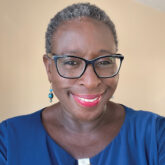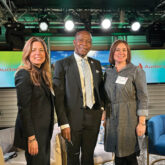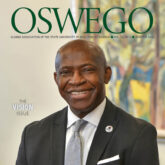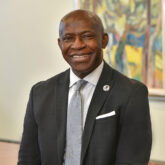Lois P. Frankel ’73, Ph.D., writes in the introduction to Nice Girls Still Don’t Get the Corner Office, that she wishes she did not have to revise her original best-seller on the 10th anniversary of its publication. She points out, however, that dismal statistics continue to show women in the workplace lag behind their male counterparts in salary, promotion and leadership and that attitudes toward female employees are largely unchanged. Frankel writes, “These statistics, comments, social changes and the women themselves make me realize my work is far from over.” The following excerpt is found on page 175:
Failing to Define
Your Brand
Not too long ago I interviewed a woman with a doctorate in organizational development for a vacancy on our coaching team. Her résumé was impressive. She seemed to have the kind of experience and education I sought, but I wasn’t sure of her specialty area. Because we’re known as a firm with subject-matter experts who can provide executives with unique expertise in their areas for development, one of the first questions I posed to this woman was “Tell me about what you’re best known for.” For the next thirty-five minutes she told me all about what she had done, what her interests were, and the many ways in which she could add value. The problem was, she didn’t answer my question. Despite another twenty minutes of probing and asking the question in several different ways, I never learned what made her unique among all organizational psychologists.
Peter Montoya, whom I consider to be the guru of personal branding, wrote, “A personal brand is a promise of performance that creates expectations in its audience. Done well, it clearly communicates the values, personality, and abilities of the person behind it.” That’s what was missing from my interview with the woman who wanted to be on our coaching team—but wasn’t selected because of her inability to clearly define her brand for me.
 In another scenario, I was doing a radio show on women and money when a call came in from a woman asking how she could better market her day-care business. I asked her to “tell me what makes your day-care business different from all the others in your community.” There was dead silence before she replied, “I guess I can’t.” As I told her, until you can clearly articulate what differentiates your brand from the others, you can’t successfully market it.
In another scenario, I was doing a radio show on women and money when a call came in from a woman asking how she could better market her day-care business. I asked her to “tell me what makes your day-care business different from all the others in your community.” There was dead silence before she replied, “I guess I can’t.” As I told her, until you can clearly articulate what differentiates your brand from the others, you can’t successfully market it.
Coaching Tips
- Make a list of the three to five things that bring you the most satisfaction at work. We tend to be good at what we like, so focusing first on these will help to point you in the right direction. You might come up with responses such as help others, listen, problem-solve, negotiate, write technical reports, manage projects, collect data, identify obstacles, implement solutions, and more.
- Next, translate these behaviors into three key strengths you bring to your workplace. For example, “My ability to listen effectively enables me to gather data from reluctant sources. Tied in with that is my skill at writing, which allows me to report that data in an objective way. Third, once the data is collected and reported, I’ve exhibited the ability to identify and implement solutions to problems.” Practice saying these words out loud so that when the time is right you can recite them fluently and confidently.
- Consider how these behaviors distinguish you from others. For example, the ability to gather and report data may be unique in a department or company known mainly for producing a product. Or having skill in building relationships may be unique and valuable in an organization where intellectual capital is the product.
- Finish this sentence: “There goes a woman who _______________________.” Now engage in the behaviors required to make that statement a reality.
Excerpted from the book Nice Girls Still Don’t Get The Corner Office, by Lois P. Frankel, Ph.D. © 2014 by Lois P. Frankel, Ph.D. Reprinted by permission of Business Plus. All rights reserved.
You might also like
More from Alumni Bookshelf
Alumni Bookshelf
Alumni Bookshelf Don Brooks ’54 The Sheltered Voyage: A Memoir of Gratitude Don Brooks, 2019. This book is a small window on a journey …
Alumni Bookshelf
Alumni Bookshelf Mark Allen Baker ’79 Between the Ropes at Madison Square Garden: The History of an Iconic Boxing Ring, 1925-2007 McFarland and …













